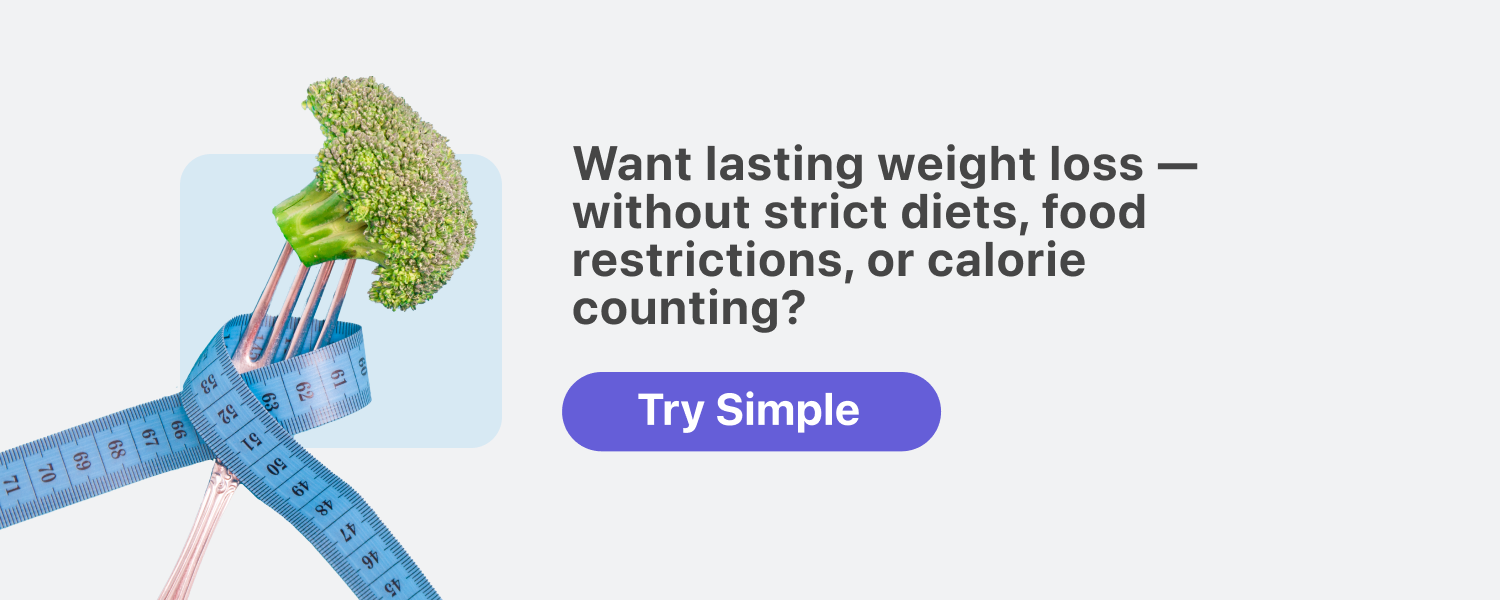15 reasons why intermittent fasting is not working for you

Losing weight isn’t always easy to do.
Food is delicious.
Life is challenging.
We often use the former to cope with the latter, and it’s never as simple as “just eat less and move more.”

Intermittent fasting can seem like the perfect answer: a way to improve how you eat simply by applying some structure around when you eat and when you don’t.
But intermittent fasting isn’t a magic bullet. It doesn’t just … deliver. There are a bunch of “Good Health Principles” that still apply, and those are key to getting results.
So, if you’re intermittent fasting and it’s not working, don’t give up!
We can help.
Let’s break down the top 15 reasons you might be getting stuck and see what levers you can pull to get moving on your weight loss goals.

15 reasons why you are not losing weight on intermittent fasting
If you’re finding that you’re intermittent fasting like a trooper but not winning at losing weight, one of these 15 reasons may hold the key.
First up, though, let’s clarify some basics around how intermittent fasting can work for weight loss.[1]
How do weight loss and intermittent fasting work?
Intermittent fasting works for weight loss for a few reasons.
- If you’re fasting for a number of hours per day, you theoretically have fewer hours to eat. So, your calorie intake may be naturally reduced.
- When you’re fasting, your body has to use your energy stores to fuel your daily activity. It’ll start with your glycogen stores, and once they’re gone, it’ll move on to your fat stores. This process is called ketosis.
- You might find that restricting your eating to certain times of the day means you are better able to resist snacking.
So, what can get in the way of these situations? Let’s get into it.
1. Too many calories
To lose weight, intermittent fasting needs to help you hit the fundamental principle of weight loss:
Eating less than you burn.
(We cover this in more detail in our “How to burn fat” guide.)
But it’s easier said than done. Hunger and cravings can be real kickers when you’re fasting and can override your best intentions to keep your calorie count where you want it.
Try these tips.
- Write yourself a meal plan (use our “How to meal plan” guide to help) so that you know what you’re gonna eat ahead of time.
- Drink plenty of water to curb hunger.
- During your eating window, eat mindfully, when you’re hungry, and until you’re satisfied.
- Use a calorie tracker for a while to:
- assess how much you’re eating
- calibrate your portion sizes
- find places where you could save a little energy
2. Not enough high-quality nutrition

Yes, intermittent fasting is more about when you eat than what you eat. But for intermittent fasting to generate results, the basics of good nutrition still apply.
A quick refresher on those basics:
- eat more lean protein, whole grains, veggies, fruits, calcium-rich foods, and healthy fats
- eat less ultra-processed foods, refined carbs, and unhealthy fats
Your next step to flip your results from stalled to stellar:
Dive into the details of what to eat during intermittent fasting.
3. The fasts are too short
While it’s not true that the longer you fast, the better your results (i.e., weight loss will not go up and up if you fast for longer and longer), you do need a fast that’s long enough that your body responds.
It’s totally cool to start by simply lopping an hour off your already-existing eating window. But you will need to stretch your fast over time to generate some impact.
Try adding an hour to your fast and see if that kick-starts your results. Anything from 12 to 18 hours has been shown to be effective.
4. You need a different intermittent fasting schedule
If the 20-hour fasts of the Warrior Diet make you want to slap everyone in your office for having the audacity to exist (HOW DARE THEY!), we’d wager that it’s not the right intermittent fasting schedule for you.
Your intermittent fasting schedule has to:
- be doable over the long term
- not make you hate life
- fit with your family, work, exercise, and social schedule
Check in with yourself. Does your intermittent fasting schedule feel like a good fit? If it isn’t, take our Simple quiz, and we can help you figure out the best approach for your unique body, preferences, and lifestyle.
5. Insufficient sleep
For losing weight, sleepy time matters.[2]
Here’s why.
For you to eat the right amount for your body, leptin and ghrelin need to both be doing their job. Ghrelin tells you you’re hungry, so you eat. Leptin tells you you’re full, so you stop.
When you don’t sleep enough, those signals get a bit iffy. You feel extra hungry. You don’t get full like you normally do.
All of which is a road to eating more food than you need. Track your sleep hours for a week. Could you use a little more?
6. Skipping meals
It’s so easy to get caught up in the idea that eating as little as possible is the “best” way to lose weight.
But when cutting calories for weight loss, there’s a sweet spot. Cut them too harshly, and you kick off a cascade of consequences.
Your hunger and cravings skyrocket.
Your metabolism slows.
You burn muscle for energy.
This is your body trying to:
- increase the energy coming in
- conserve the energy it has
- find alternative fuel sources
This could be why you think intermittent fasting doesn’t work for you. It’s pretty hard not to break your fast when your hunger and cravings are raging.
Try this:
During your eating window, eat till you’re full. That’ll satisfy your hunger and fuel your activity, and then your body won’t need to compensate.
7. You’re losing fat, not weight
Maybe you’re doing awesome at losing fat, but it’s not showing up on the scale as you expected it would. When you lose fat, you may — or may not — lose weight.
The scale isn’t the only place you’ll find your results. How are your clothes fitting? What do you notice in the mirror?
We unpack fat loss vs. weight loss (plus more about how you can measure fat loss) here.
8. Not drinking enough water
Water genuinely is one of the MVPs for creating a caloric deficit.[3]
Check the science on this. Drinking more water can help you:
- eat less [4]
- feel fuller [5]
- curb hunger [5]
- drink fewer fat-loss-inhibiting drinks [6]
- increase your resting metabolic rate [7]
Do you need to drink more?
If you don’t know your unique hydration needs — or whether you’re meeting them — take our Simple quiz. We’ll work that out for you, hook you up with a water tracker, and help you increase your water intake. (We’ll cheer on your fasting, too!).
9. Exercising too much

Just like it’s easy to over-cut calories, it’s easy to overdo exercise.
We often think more is better. But, because exercise is a stressor, what we need is the magical point of “enough.” Enough exercise will get you results and also allow you to recover.
Overdoing exercise has consequences (especially if you’re also undereating), like:
- feeling constantly exhausted
- losing your mojo for working out
- sleeping badly
- having physical niggles and pains
- getting sick more often
- experiencing increased hunger and cravings
If you’re experiencing any of these and your exercise volume is high (7+ hours a week), try swapping a workout for an active recovery session, like going for a walk instead of doing HIIT or lifting weights.
We have more ideas for you here: intermittent fasting and exercise.
10. Hidden calories in drinks
Sports drinks.
Organic juices.
Coffee with cream (mmmmmmm).
The internet will say things like, “You must avoid these drinks at all costs.” (The internet can be a scaremonger like that.) These drinks have their place. You don’t have to run screaming from them.
But.
They do all have calories, sugars, and/or fats. And because they go down easy, they often fly beneath our calorie-tracking radar.
If your scales are stuck on a number that isn’t making you happy, check your diet for these guys. Then, check out our “What can you drink while fasting” to add a li’l flavor to your fasting drink game.
11. Chronic stress
One story here goes like this:
- Chronic stress increases cortisol.
- Cortisol increases blood sugar (so that you have some ready energy to punch out the tiger that’s trying to bite you).
- Sugar in the blood increases insulin.
- Insulin means more fat gain, or at least a disruption of ketosis and, therefore, less fat burning.
There’s some truth to that, but really, there’s a bigger reason stress stunts weight loss:
Its impact on our behaviors.
When we’re stressed, we might use food or alcohol to cope. We might skip workouts. Cravings might be constant and impossible to ignore. We don’t sleep as well.
In a nutshell, stress makes it harder to make healthy choices.
If this all rings true for you, what support do you need to cope with the stress you’re facing? Go get that support.[8]

12. Not enough protein
If you’re not losing weight on intermittent fasting, look to your protein intake. Protein is a good friend to weight loss. It can help:
- increase feelings of fullness [9]
- decrease hunger [9]
- increases your metabolic rate [10]
- create and preserve muscle [11]
Aim to get at least a portion of protein with every meal. Over time, shoot for around 0.4 g per lb of body weight per day. If you’re a regular exerciser, bump that up to 0.6–0.9 g per lb.
13. Too many processed foods
We’ve talked about needing high-quality, nutrient-rich foods. Eating fewer ultra-processed, refined, low-nutrient foods goes hand in hand with that.
If you’re not losing weight with intermittent fasting, this is a fruitful area to look for increased results.
What you don’t eat matters as much as what you do.
These are the foods that:
- spike your cravings [12]
- make you hungrier
- are hard to stop eating once you start
Foods like chips, pastries, ice cream, processed meats, candy, and chocolate. They’re super palatable, comforting, and often attached to our relaxation rituals, like kicking back after a tough week.
We’re not saying you have to give these up completely (we’re not monsters!). But, if you’re intermittent fasting and seeing no weight loss, see how you might cut back a little.
14. You need more time
When we start any weight loss process, our expectations are often not calibrated to reality. We get frustrated because we think results will show up faster than they do.
It’s totally normal. We want what we want, and we want it NOW. But weight loss takes time. Getting good enough at intermittent fasting and eating a diet that’s optimized for weight loss takes time, too.
If the cry of “Why is intermittent fasting not working for me!?” is rolling around your mind, but it’s only been a couple of weeks or a month, hang in there. Using this list as a guide, ask yourself where you could tighten things up.
15. “Falling off the wagon”
This can be a real kicker. It feels like you’re trying SO hard and doing everything “right,” but in reality, there are all these little slipups holding you back.
Hey, we’re not judging. We’ve been there many times. Lean in and observe the consistency of your actions.
- Are you getting 7–9 hours of sleep every night?
- Are you eating protein at every meal?
- What’s your overall tally of “off-schedule” food and drink?
- Do you drink enough water every day?
You don’t have to be perfect. Honestly, you don’t. But you do need to create a critical mass of actions that lead to weight loss for weight loss to occur.
Where can you up your consistency?
When do you start losing weight on intermittent fasting?
A lot of factors impact how quickly you’ll lose weight with intermittent fasting. Factors like:
- your starting weight
- your intermittent fasting schedule
- your eating habits
- your level of activity
- any health issues you have
- your stress levels
As you’ve seen, getting results with intermittent fasting isn’t as simple as just executing the fasts. There are many different behaviors that contribute to losing weight.
And it takes time to develop consistency with those behaviors.
Ideally, after a couple of weeks of practicing, you’ll settle into a caloric deficit via fasting and paying attention to what you eat, and your weight loss will start to tick up.
How do you break the weight loss plateau?
It’s pretty common for people to hit a plateau in weight loss.[13] And it’s mega frustrating, not to mention demoralizing. You’re doing everything right, and the results have (seemingly) stopped showing up as a reward?! You’ve got to be kidding!
There are a lot of theories on why (like maybe our metabolism rebalances after a while [14]) and when (anywhere from a few weeks to a few months [15]) but it really comes down to one — admittedly complex — factor:
You.
Everyone responds to fasting differently, so if, when, and for how long you experience a weight loss plateau depends on lots of individual factors, too.
A lot of the suggestions we discussed above — like managing stress, getting enough protein, and limiting processed foods — may be equally helpful in fending off a weight loss plateau. But if you find yourself hitting a wall, it may be time to shake things up. Check in with your doctor or a registered dietitian to see if making some changes to your eating routine, fasting schedule, physical activity levels, or general lifestyle might reinvigorate things.
5 tips for weight loss success when intermittent fasting

- Remember, it’s OK to mess up
You’re human, and sometimes your human self will take a wrong turn.
You’ll break your fast early. You’ll have Twinkies for lunch. You’ll drink two triple-caff frappuccinos even though you know black coffee is “better.”
It’s OK. Wipe the slate, keep calm, and carry on.
- Stay focused
After the initial excitement of doing a new thing has worn off, it’s easy to lose focus on your weight loss plans. Life gets busy, and you skip meal planning over the weekend. You get absorbed in your work and go the whole day without drinking any water.
Find a way to keep your goals front and center.
They need to at least be near the top of the priority list; otherwise, life and other pastimes will bury them.
- Know your deeper motivation
This can help with staying focused: know WHY you want to lose weight.
Not just the top-level reason, like, “I want to weigh X lbs,” or “I’m going to my sister’s wedding.”
Dig down for the deeper reasons. How will weighing X lbs improve your life? Will it bring you confidence? Happiness? Easier movement? Less painful joints?
Once you know, put that Why somewhere you can see it every day.
- Get some backup
It’s easier to lose weight when you have backup around you.
Who’s on your team? Find those people and enlist their support.
- Shoot for small changes each week
Once you’re feeling steady with intermittent fasting, look for small improvements you can make each week to keep moving forward.
For instance:
- Go to bed 15 minutes earlier.
- Drink an extra glass of water a day.
- Go for a 20-minute walk each day.
- Add an extra portion of veggies to dinner.
Should you give up if you’re not losing weight?
If everything we’ve discussed up until now feels like an exhausting laundry list of “been there, done that,” you’re probably asking yourself if you should even keep trying (or screaming into the “Why isn’t this working?!” void of despair … )
It is definitely possible that intermittent fasting just won’t cut it for your weight loss journey, and that’s absolutely OK — there are plenty of other food routines and lifestyle modifications you can try.
Before you throw in the proverbial towel — or start playing roulette with your routines — sit down with your primary care provider or a registered dietitian to discuss your experiences so far. They can see the grains of sand as well as the whole beach, so they’re your best resource for figuring out what might suit you and your goals best, whether that’s further tweaks to your current approach or an entirely new weight loss strategy.
Frequently asked questions about why intermittent fasting is not working for you
You can speed up your intermittent fasting results by:
- eating enough protein
- drinking more water
- being active
- getting enough sleep
- managing your stress
The most successful method of intermittent fasting is the one you can stick to with the least effort.
As far as science goes, 16:8 seems to have the most studies backing it up.
How many days intermittent fasting takes to show results depends on how well you do it. The more consistent you are with fasting and eating well, the faster your results will show up.
Shooting for 1–2 lbs per week is a smart, sustainable goal. It seems slow, but it adds up over time.
Your weight loss might be slow with intermittent fasting for a number of reasons. Work down this list, be honest with yourself, and try making some changes.

- Welton S, Minty R, O’Driscoll T, Willms H, Poirier D, Madden S, et al. Intermittent fasting and weight loss: Systematic review. Can Fam Physician. 2020 Feb;66(2):117–25.
- Papatriantafyllou E, Efthymiou D, Zoumbaneas E, Popescu CA, Vassilopoulou E. Sleep Deprivation: Effects on Weight Loss and Weight Loss Maintenance. Nutrients [Internet]. 2022 Apr 8;14(8).
- Davy BM, Dennis EA, Dengo AL, Wilson KL, Davy KP. Water consumption reduces energy intake at a breakfast meal in obese older adults. J Am Diet Assoc. 2008 Jul;108(7):1236–9.
- Dennis EA, Dengo AL, Comber DL, Flack KD, Savla J, Davy KP, et al. Water consumption increases weight loss during a hypocaloric diet intervention in middle-aged and older adults. Obesity. 2010 Feb;18(2):300–7.
- Corney RA, Sunderland C, James LJ. Immediate pre-meal water ingestion decreases voluntary food intake in lean young males. Eur J Nutr. 2016 Mar;55(2):815–9.
- Anari R, Amani R, Veissi M. Sugar-sweetened beverages consumption is associated with abdominal obesity risk in diabetic patients. Diabetes Metab Syndr. 2017 Dec;11 Suppl 2:S675–8.
- Boschmann M, Steiniger J, Hille U, Tank J, Adams F, Sharma AM, et al. Water-induced thermogenesis. J Clin Endocrinol Metab. 2003 Dec;88(12):6015–9.
- Xenaki N, Bacopoulou F, Kokkinos A, Nicolaides NC, Chrousos GP, Darviri C. Impact of a stress management program on weight loss, mental health and lifestyle in adults with obesity: a randomized controlled trial. J Mol Biochem. 2018 Oct 3;7(2):78–84.
- Leidy HJ, Clifton PM, Astrup A, Wycherley TP, Westerterp-Plantenga MS, Luscombe-Marsh ND, et al. The role of protein in weight loss and maintenance. Am J Clin Nutr. 2015 Jun;101(6):1320S – 1329S.
- Moon J, Koh G. Clinical Evidence and Mechanisms of High-Protein Diet-Induced Weight Loss. J Obes Metab Syndr. 2020 Sep 30;29(3):166–73.
- Cava E, Yeat NC, Mittendorfer B. Preserving Healthy Muscle during Weight Loss. Adv Nutr. 2017 May;8(3):511–9.
- Edwin Thanarajah S, DiFeliceantonio AG, Albus K, Kuzmanovic B, Rigoux L, Iglesias S, et al. Habitual daily intake of a sweet and fatty snack modulates reward processing in humans. Cell Metab. 2023 Apr 4;35(4):571–84.e6.
- Sarwan G, Rehman A. Management of Weight Loss Plateau. StatPearls Publishing; 2022.
- Müller MJ, Geisler C, Heymsfield SB, Bosy-Westphal A. Recent advances in understanding body weight homeostasis in humans. F1000Res [Internet]. 2018 Jul 9;7.
- Wing RR, Phelan S. Long-term weight loss maintenance. Am J Clin Nutr. 2005 Jul;82(1 Suppl):222S – 225S.
